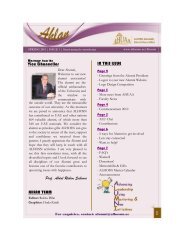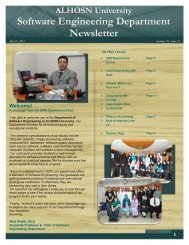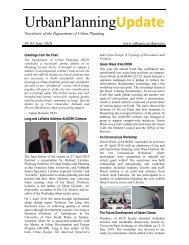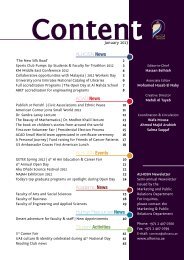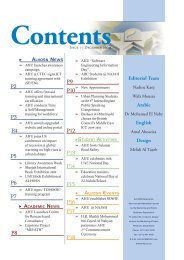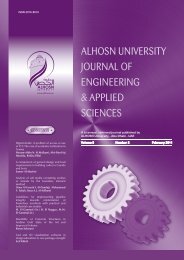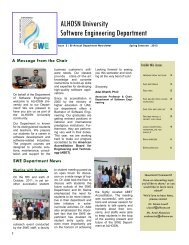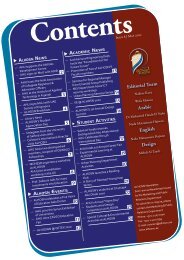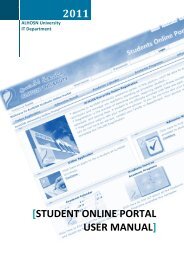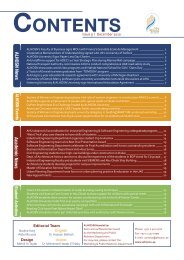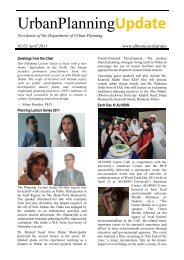ALHOSN University Catalogue Global Knowledge with Local Vision ...
ALHOSN University Catalogue Global Knowledge with Local Vision ...
ALHOSN University Catalogue Global Knowledge with Local Vision ...
You also want an ePaper? Increase the reach of your titles
YUMPU automatically turns print PDFs into web optimized ePapers that Google loves.
BEd in English <strong>University</strong> General Requirements (UGR) Courses<br />
Course Code Course Title Credits<br />
FAS 104 <strong>Global</strong>ization 3<br />
FBA 102 Intro to Entrepreneurship 3<br />
FES 105 Landscaping and Flower Arrangement 3<br />
FAS 105 Scientific Miraculousness in The Quran 3<br />
FAS 106 History of Sciences 3<br />
FAS 107 Sports in our Life 3<br />
FAS 108 Ethics 3<br />
FES 106 Human and Health 3<br />
FES 107 Interior Design 3<br />
FAS 109 Human Rights in Law and Shari’ah 3<br />
Course Descriptions<br />
ENG 201 Listening and Speaking 1 – ENG (3 = 3 + 0)<br />
This course helps students to use correct grammatical structures in spoken English; to develop a speaking<br />
vocabulary useful for their academic work in the department; to use standard pronunciation useful for an<br />
international setting; and to develop listening and speaking strategies useful to academic settings. Where cultural<br />
settings of discourse are unfamiliar to Arab students, the course teaches the basics in effective communication for<br />
that strategy. Students are also asked to listen to stories and retell them in the classroom.<br />
ENG 202 Writing 1 (3 = 3 + 0)<br />
An introduction to the composition process from the sentence on to the paragraph via various approaches, <strong>with</strong><br />
emphasis on editing and revising for format, usage, punctuation, spelling, and capitalization. The student is taught<br />
to employ sentence patterns and methods of sentence formation into a sequence conveying a central idea of<br />
thought in the composition of descriptive, comparative, and explanatory paragraphs.<br />
ENG 203 Basic Grammar and Usage (3 = 3 + 0)<br />
This course is designed to activate the student’s passive language base and make him/her more conscious of the<br />
basic formal workings of grammar in English. Emphasis is on grammar in action for the purposes of oral and<br />
written communication.<br />
ENG 204 Reading Comprehension (3 = 3 + 0)<br />
The course provides practice for intensive and extensive reading at an advanced level. Texts are selected <strong>with</strong> a<br />
view of their variety of subject matter and style, in addition to being relevant to the students’ interests and needs.<br />
Students are expected to read a variety of texts including reading maps, tables, charts and diagrams. They are<br />
also expected to read critically (see Teaching and Learning Strategies in this course syllabus).<br />
ENG 205 Listening and Speaking 2 – ENG (3 = 3 + 0)<br />
This is a continuation of Listening and Speaking 1 <strong>with</strong> the four main concerns remaining. A higher level of<br />
fluency is expected in completing the course. However, this course includes more intensive practice in<br />
communications that are likely to be cross-cultural. It is based on audio tapes, film and analysis of film narrative.<br />
Films form a substantial body of communication that helps us to form our views of the world. They are a key<br />
to contemporary culture and are worthy of serious critical attention. Indeed, their effect is so great that it is<br />
essential that they are understood in a critical way. Students will learn to ‘read’ film in the same way as they read a<br />
novel or any text. They will discuss the various aspects of films, such as theme, characterization and character<br />
motivation, plot development etc., as well as other topics related to the film. Students are also asked to listen to<br />
stories and tell them in the classroom.<br />
ENG 301 Writing 2 (3 = 3 + 0)<br />
This is the second course in the writing sequence. It integrates the methods of Writing I into more complex<br />
writing strategies to give students a solid grounding in writing techniques and skills (analysis, comparison/contrast,<br />
cause-effect, argumentation, narrative, description, and critique). There is particular attention here to the use of<br />
self-expressive, communicative and rhetorical methods in the organization and development of longer and more<br />
challenging paragraphs. In addition, the course offers classroom analysis and discussion of professional models of<br />
expository prose, followed by written exercises in long paragraph writing <strong>with</strong> some individual attention.<br />
162



